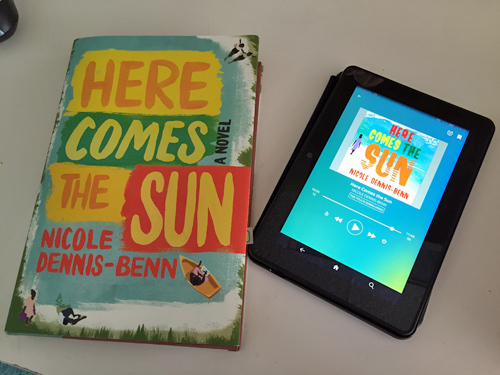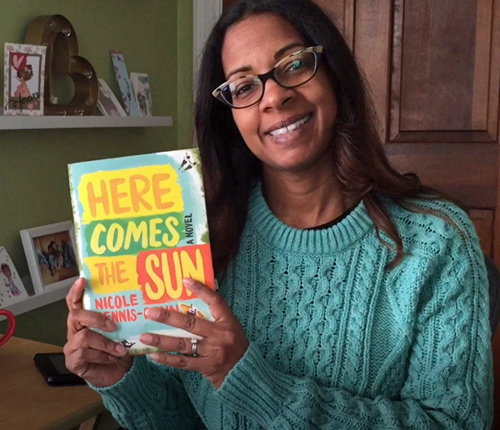
Title: Here Comes the Sun
Author: Nicole Dennis-Benn
Copyright: June 2, 2016
Genre: fiction
Format: book and audiobook Pages: 352
I have read so many books lately, particularly in the month of January and am very much behind sharing my thoughts on them. So in an effort to play catch up. I will be posting some reviews rather close together. I read and listened to the audiobook edition of this book in January.
Synopsis (from Goodreads):
Capturing the distinct rhythms of Jamaican life and dialect, Nicole Dennis-Benn pens a tender hymn to a world hidden among pristine beaches and the wide expanse of turquoise seas. At an opulent resort in Montego Bay, Margot hustles to send her younger sister, Thandi, to school. Taught as a girl to trade her sexuality for survival, Margot is ruthlessly determined to shield Thandi from the same fate. When plans for a new hotel threaten their village, Margot sees not only an opportunity for her own financial independence but also perhaps a chance to admit a shocking secret: her forbidden love for another woman. As they face the impending destruction of their community, each woman fighting to balance the burdens she shoulders with the freedom she craves must confront long-hidden scars. From a much-heralded new writer, Here Comes the Sun offers a dramatic glimpse into a vibrant, passionate world most outsiders see simply as paradise.
My Thoughts:
This story is about a family in Jamaica the mother whose name is Dolores sells Jamaican keepsakes to tourists to raise money for her youngest daughter to go to college. Margo is the oldest daughter who works at a hotel and her sister’s name is Thandi. Margo is 15 years older than Thandi so she’s almost like another parent to her.
Throughout the book, issues of color are raised – the praise of lighter skin and dislike for darker skin. This is not a unique phenomenon to Jamaica. I went to Jamaica twice, and both times I do remember observing the distinct color difference in the work environments. Just as the book illustrated, the light skin people tend to hold the hospitality positions that are upfront with the tourists, as well as the more prominent jobs. While the darker skin people tend to occupy more of the labor intense jobs such as chambermaids and menial jobs.
As an African-American living in the United States, I am always curious to explore the experience of black people in other countries. One commonality is that residuals of slavery and colonization seem to have affected the psyche of the black people all over the world in very similar ways. Slavery may have ended in many places but the damage to the collective psyche remains and this book demonstrates the effects in Jamaica. When I read on page 21, how Thandi wanted to lighten her skin because she believes it will present more opportunities for her and make her “beautiful” I felt really sad. Because I believe that this is a reality for many people today. In the absence of mainstream validation and representation, some sadly fall into this state of mind.
When I completed the book, I was left wonder about the future of the three women in the story. I wonder what will happen to Margo as she goes on with her life? I wonder what will happen with Thandi now that all is been revealed? I wonder what will happen to their mother? There is no explicit ending stated. However, after time away from the story, I am ok with that. It seems more a reflection of reality than a neat and tidy ending.
Another topic of this book is homophobia in Jamaica and how people are treated in that country. The author of this book is a lesbian and left Jamaica to live a better life than she would have if she had stayed there. So I feel she could put a very authentic spin to this story based on her own experience. It was very challenging to read how the homosexuals were treated in this story.
The book does a really good job of showing how poverty can lead to so much desperation. This isn’t a feel-good book about Jamaica and how it’s such a paradise. It shows a reality for many of the people that live in this country. When tourists go to vacation there and look at that water all they see is beauty and the enjoyment of swimming in the beautiful water. While this book presents an alternate perspective of how a poor person living on this island may view the water surrounding them as trapping them from going elsewhere. It’s a totally different way of looking at the water. So in that sense, this paradise can turn into a prison.
As I’ve said I’ve been there twice now and after reading this book, I will be more mindful of my choices and interactions with the people during future visits there and as other countries.
It’s important to read books like this to give you a broader view of what life as a black person can be like on an island. I definitely will give this book 4 1/2 butterflies and I look forward to more books from this author. Below I included a bit of information about the author and a link to her website.

About the Author:

Photograph by Jason Berger
Dennis-Benn has an MFA in Creative Writing from Sarah Lawrence College and has been awarded fellowships from MacDowell Colony, Hedgebrook, Lambda, Barbara Deming Memorial Fund, Hurston/Wright, and Sewanee Writers’ Conference.
Her writing has been awarded a Richard and Julie Logsdon Fiction Prize, and two of her stories have been nominated for the prestigious Pushcart Prize in Fiction.
Dennis-Benn was born and raised in Kingston, Jamaica. She lives with her wife in Brooklyn, New York.
Read more about Nicole at her website.
Happy Reading!




